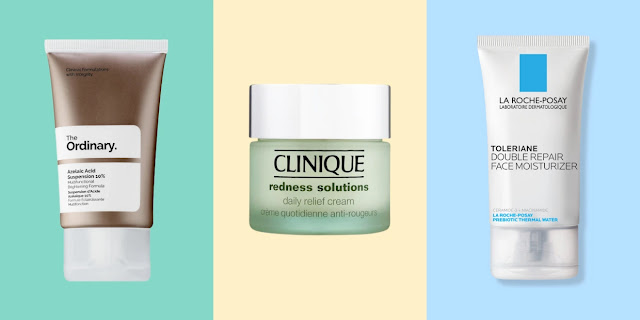
Can Vitamin C and Copper Peptides Be Used Together?
Copper peptides and vitamin C are two ingredients that can effectively benefit your skin in combination or on their own. Of the two, you may know more about vitamin C and its effects on your complexion.
Vitamin C is rich in antioxidants that fight skin damage caused by UV radiation, pollution, and other environmental factors. You’ll find that vitamin C can help fight uneven skin tone by lightening the appearance of dark spots and other areas of hyperpigmentation.
As for copper peptides, these naturally occurring chains of amino acids can boost the production of collagen and elastin in your skin. This can significantly reduce and improve the appearance of fine lines, wrinkles, enlarged pores, and sagging skin.
Well, both of these ingredients sound very effective, and I wouldn’t blame you if you wanted to use these skincare powerhouses together. But the question is: can vitamin C and copper peptides be used together? Let’s explore this together, and hopefully after today’s blog you’ll have a better idea of how to use these ingredients in your skincare routine.
Can peptides and vitamin C be used together?
Yes, you can, but vitamin C can alter the effectiveness of copper peptides. When using skincare, it’s best to wait about 10-15 minutes between applications to avoid unnecessary irritation, redness, and general skin discomfort.
Each of these ingredients can deliver impressive skin results on their own. But when used correctly, vitamin C can protect your skin from harmful free radicals, which can cause all kinds of skin damage. While peptides boost collagen in the lower layers of your skin, your complexion remains at its healthiest. In other words, you’ll find that all the new cells that the peptides instruct your skin to produce will be protected by the vitamin C.
If you’re wondering if there are certain ingredients you should avoid, check out our blog post on which ingredients not to use with peptides and vitamin C.
Can vitamin C and copper be used together?
Yes, but be careful. This is mainly because when copper and vitamin C are layered on top of each other, their effects on the skin can sometimes cancel each other out. You’ll notice that at varying concentrations of copper, ascorbic acid (also known as vitamin C) can oxidize. This oxidation can cause the vitamin C to work less effectively, which reduces the efficacy of your skin-brightening power.
Beyond that, it’s just a matter of applying each ingredient at the optimal time and making sure both are absorbed by the skin without any adverse side effects. You can use a product rich in either ingredient, leaving 30 minutes between applications. Alternatively, you could try using Vitamin C in the morning and then the peptides in the evening. This allows your skin to be fully protected and your skin barrier strengthened, while any signs or existing damage can be addressed in the evening with the skin-healing benefits of copper.
What can copper peptides be combined with?
There are a few ingredients that can be combined with copper peptides, such as hyaluronic acid, amino acids, and niacinamide. They all work specifically to provide extra moisture to the skin, keeping the skin barrier fully functioning and at its healthiest.
The beauty of copper peptides is that they work well with any skincare ingredient. Even those that require caution, such as retinoids, vitamin C, and AHAs, all of which should be used every other day with plenty of time between applications to avoid unwanted skin irritation or reactions.
Which came first, the peptides or the vitamin C?
When it comes to getting the most out of your skincare, many people forget the simple distinction of using the products in the right order, which can have a bigger impact than you think! A general rule of thumb when applying daily is to start with the thinnest concentration and work your way up to the thickest.
When it comes to deciding which comes first, peptides or vitamin C, it depends a lot on the formula they are mixed into. You may find both ingredients in serums, face oils, moisturizers, and masks that you use at the end of your daily regimen.
Another point to consider is that your skin’s needs change throughout the day. She has a 24-hour circadian rhythm, which ultimately results in her needing protection from environmental factors such as UV rays and pollution throughout the day. At night, when you get your beauty sleep, she needs help repairing and rejuvenating her skin.
Are copper peptides better than vitamin C?
A lot depends on what copper peptides and vitamin C do for your skin, your skin care routine, and your personal preferences. Both ingredients can improve skin firmness and smoothness and contain a lot of antioxidants to fight free radical damage. You can use either of these ingredients daily in your routine and reap the benefits, but using them once a day may also be beneficial. It will just take some trial and error to find the best way to incorporate both ingredients into your daily routine. Don’t forget, if you have never used copper peptides or vitamin C-rich products before, I recommend consulting a doctor or dermatologist to make sure you are using the best combination for your skin.
Should Vitamin C be used during the day or at night?
This is a matter of personal preference, as you can use Vitamin C throughout the day. However, many beauty experts and skincare enthusiasts would recommend using a Vitamin C-rich serum and moisturizer as part of your morning routine. This is because ascorbic acid (Vitamin C) is effective at brightening your complexion, and its antioxidant properties protect against skin damage and environmental aggressors. If you want to use Vitamin C at night, you can definitely do so, but remember that it’s best to avoid strong retinoids as they can cause severe dryness, irritation, and redness.
So, here’s more information on whether Vitamin C and Copper Peptides can be used together. And if you have any questions, don’t forget to follow Procoal’s Instagram account.


